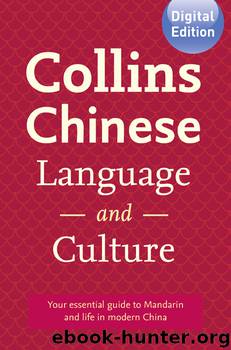Collins Chinese Language and Culture by Collins

Author:Collins [Collins]
Language: eng
Format: epub
ISBN: 9780007502424
Publisher: HarperCollins Publishers
Published: 2012-04-13T16:00:00+00:00
Chéngyǔ
Chéngyǔ form probably the most well-known category of Chinese saying – and the most dauntingly large. Chéngyǔ , which in Chinese literally means ‘set phrases’, are fixed usage idioms, mostly four syllables in length. It’s said that over 90 per cent of Chinese chéngyǔ are composed of four characters. This is because the Chinese language can be said to naturally form words and phrases in twos, and as a result chéngyǔ are sometimes mistakenly labelled ‘four character idioms’. This is a little misleading, as longer chéngyǔ do exist, although they are in the definite minority. Chéngyǔ are a simple way of expressing a certain meaning that can describe a person or state of affairs, or offer up a snapshot of worldly wisdom. The majority of chéngyǔ idioms have been passed down from ancient times, and as such their wording is naturally different to that of modern Mandarin.
Download
This site does not store any files on its server. We only index and link to content provided by other sites. Please contact the content providers to delete copyright contents if any and email us, we'll remove relevant links or contents immediately.
Housekeeping by Marilynne Robinson(4433)
Papillon (English) by Henri Charrière(4251)
The Poetry of Pablo Neruda by Pablo Neruda(4088)
World without end by Ken Follett(3472)
TCP IP by Todd Lammle(3175)
Fluent Forever: How to Learn Any Language Fast and Never Forget It by Gabriel Wyner(3074)
The Rape Of Nanking by Iris Chang(2806)
How Proust Can Change Your Life by Alain De Botton(2795)
The Alchemist by Paulo Coelho(2684)
The Partner by John Grisham(2393)
Two lives by Helen Naylor(2296)
Hitler by Ian Kershaw(2193)
Yerma by Federico García Lorca(2062)
Sophie's World by Jostein Gaarder(2013)
Smilla's Sense of Snow by Peter Hoeg(1929)
Merriam-Webster's Pocket Dictionary by Merriam-Webster(1929)
Twilight of Idols and Anti-Christ by Friedrich Nietzsche(1886)
Il cavaliere inesistente by Italo Calvino(1851)
Deep Writing by Eric Maisel(1813)
